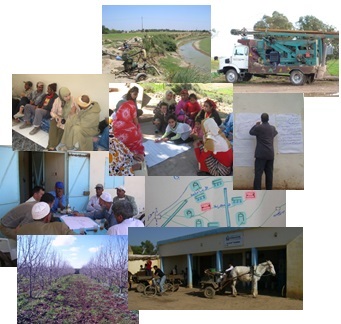Chadia Arab, Mustapha Azaitraoui
https://doi.org/10.60569/hsoua-a3
Hors série ouvrières agricoles, novembre 2024
Résumé
Le travail agricole au Maroc est un secteur d’activités important et majoritairement féminin. Plus de la moitié (57%) des ouvriers agricoles sont des femmes. Les ouvrières agricoles sont indispensables et contribuent au développement agricole du pays. Elles sont toutefois peu visibles dans les travaux de recherche, dans les politiques publiques et dans le débat portant sur les dynamiques agricoles du pays. Les conditions de travail restent difficiles, le salaire relativement bas, et le travail irrégulier. Ce sont principalement des femmes qui sont touchées par la précarité économique et sociale. A partir d’une enquête qualitative réalisée dans la région de Béni Mellal- Khénifra, notre article va mettre en exergue comment ces femmes sont finalement mal accompagnées pour sortir de cette pauvreté dans laquelle elles sont très souvent assignées. Nous montrerons comment les acteurs institutionnels participent à mettre de côté certaines femmes, les marginalisant encore plus, en les noyant dans un groupe plus large des « femmes rurales » auxquelles elles ne sont pas toujours assimilées. Elles sont alors très souvent exclues des dispositifs d’appui car elles ne sont pas directement concernées par l’accompagnement proposé. Une des rares opportunités offertes par les institutions de l’agriculture est les activités génératrices de revenu et en particulier les coopératives, souvent présentées comme une solution miracle. Or ces activités concernent une infime partie des ouvrières agricoles, et souvent il s’agit de celles qui sont les plus « avancées », laissant à la marge celles qui en auraient le plus besoin. Au final, nous montrerons comment les institutions considèrent les ouvrières agricoles très souvent comme se situant hors champ de leur intervention.
Mots clés : Ouvrières agricoles, précarité, politiques publiques, Béni Mellal-Khénifra
فاعلو التنمية والعاملات الزراعيات في المغرب: دراسة حالة جهة بني ملال – خنيفرة
الملخص
يعتبر العمل الفلاحي في المغرب قطاعًا هامًا ويغلب عليه الطابع النسائي. حيث إن أكثر من نصف (57٪) العاملين في مجال الزراعة هم من النساء. تساهم العاملات الزراعيات بشكل كبير في التنمية الزراعية للبلاد، ومع ذلك، فإنهن غير مرئيات إلا قليلاً في الأعمال البحثية، والسياسات العامة، والنقاشات حول الديناميكيات الزراعية في المغرب. تظل ظروف العمل صعبة، والأجور منخفضة نسبيًا، والعمل غير منتظم، مما يجعل النساء الأكثر تعرضًا للهشاشة الاقتصادية والاجتماعية. بناءً على دراسة كيفية أُجريت في منطقة بني ملال-خنيفرة، سنسلط الضوء في هذا المقال على كيفية ضعف الدعم الذي تحصل عليه هؤلاء النساء للخروج من الفقر الذي يعشن فيه. سنبين كيف تساهم الجهات المؤسسية في تهميش هؤلاء النساء عبر إدراجهن في فئة أوسع من « النساء الريفيات » والتي لا تتوافق دائمًا مع وضعهن كعاملات زراعيات. وبالتالي، يتم استبعادهن في كثير من الأحيان من أنظمة الدعم، لأنهن لا يُعتبرن مستهدفات مباشرة في برامج الدعم المتاحة. إحدى الفرص النادرة التي توفرها المؤسسات الزراعية هي الأنشطة المدرة للدخل، لا سيما التعاونيات، التي غالبًا ما يتم تقديمها كحل سحري. ومع ذلك، تهم هذه الأنشطة نسبة ضئيلة فقط من العاملات الزراعيات، وغالبًا ما تشمل تلك الأكثر تقدمًا، مما يترك العديد ممن هن بأمس الحاجة للدعم على الهامش. في النهاية، سنبين كيف تعتبر المؤسسات غالبًا العاملات الزراعيات خارج نطاق تدخلها.
الكلمات المفتاحية: العاملات الزراعيات، الهشاشة، السياسات العامة، بني ملال-خنيفرة.
Development actors and women farm workers in Morocco. The case of the Beni Mellal – Khenifra region
Abstract
Agricultural work in Morocco is an important sector of activity, and the majority of its workers are women. More than half (57%) of agricultural workers are women. Female agricultural workers are indispensable and contribute to the country’s agricultural development. However, they have a low profile in research, public policy and the debate on the country’s agricultural dynamics. Working conditions remain difficult, pay is relatively low and work is irregular. It is mainly women who are affected by economic and social insecurity. Based on a qualitative study carried out in the Beni Mellal-Khénifra region, our article will highlight how these women are poorly supported in their efforts to escape from poverty, in a situation where they are so often relegated. We will show how institutional players often sideline certain women, marginalising them even further, by lumping them in with a wider group of ‘rural women’ with whom they are not always identified. As a result, they are very often excluded from support schemes, because they are not directly concerned by the support offered. One of the few opportunities offered by agricultural institutions is income-generating activities, particularly cooperatives, which are often presented as a miracle solution. Yet these activities concern only a tiny proportion of women farm workers, and often those who are most advanced, leaving behind those who need them most. In the end, we will show how institutions very often consider women farm workers to be outside the scope of their intervention.
Key words: Female farm workers, insecurity, public policies, Beni Mellal-Khénifra

